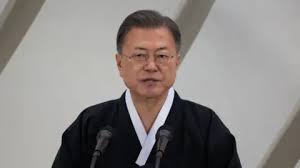WORLD

PROSECUTORS CHARGE EX-PRESIDENT MOON IN CORRUPTION CASE, CONTINUING SOUTH KOREA'S POLITICAL CURSE
In a dramatic development that continues South Korea's tradition of prosecuting former leaders, ex-President Moon Jae-in has been indicted on bribery charges. The case alleges Moon facilitated improper business advantages for his son-in-law during his 2017-2022 presidency, marking another chapter in the country's turbulent political history.
The indictment centers on the 2018 appointment of Moon's son-in-law, identified only as Seo, to an executive position at Thai Eastar Jet - a subsidiary of budget carrier Eastar Jet. Prosecutors contend the hiring was improper, citing Seo's lack of aviation experience and alleging it was part of a quid pro quo arrangement. They claim the appointment was exchanged for favorable treatment of Eastar Jet's founder, Lee Sang-jik, who subsequently received a leadership position at the state-run Korea SMEs and Startups Agency.
According to investigators, Seo received approximately 217 million won ($150,000) in salary and benefits during his tenure, which they characterize as illicit compensation to Moon. The former president's political party has vehemently denied the allegations, framing the indictment as a politically motivated attack by the current conservative administration.
This legal action follows a pattern in South Korea where nearly every living former president has faced criminal allegations after leaving office. Moon, who gained international recognition for his diplomatic overtures to North Korea including summits with Kim Jong-un, now joins this unfortunate tradition. The case has reignited debates about political justice in South Korea, with progressives decrying what they see as partisan prosecutions while conservatives defend them as necessary accountability measures.
Legal experts anticipate protracted court proceedings that could span years, given the likelihood of appeals. The outcome may significantly impact Moon's
legacy and South Korea's political landscape ahead of future elections. As the case unfolds, it promises to keep alive longstanding questions about whether such prosecutions represent genuine anti-corruption efforts or merely the latest episode in the country's cycle of political retribution.
The indictment comes amid broader investigations into Moon's administration, including recent charges against his former national security advisor and defense minister over alleged intelligence leaks. These developments underscore the intense political polarization that continues to shape South Korea's democracy, where presidential transitions often bring investigations of previous administrations.
"This represents a significant development in our ongoing coverage of current events."— Editorial Board









